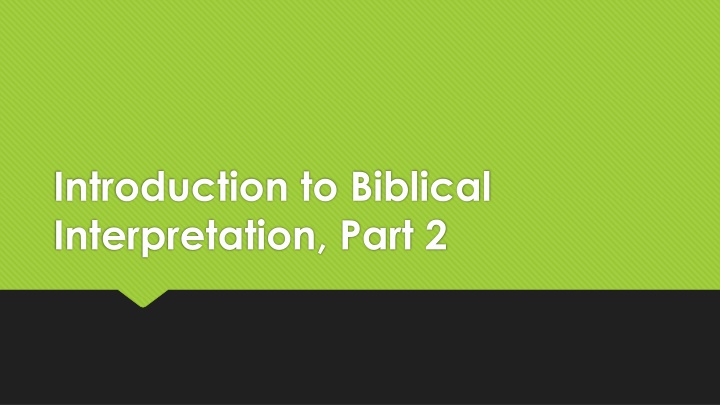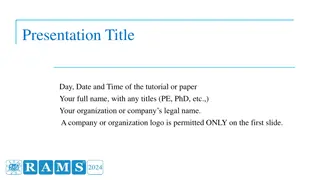
Biblical Interpretation Insights: Session Highlights & Objectives
Explore insights and objectives from a session on biblical interpretation, including getting to know each other, understanding hermeneutical concepts, and preparing for future classes. Delve into the importance of interpretation, exegesis, and communication in conveying biblical meanings to audiences.
Download Presentation

Please find below an Image/Link to download the presentation.
The content on the website is provided AS IS for your information and personal use only. It may not be sold, licensed, or shared on other websites without obtaining consent from the author. If you encounter any issues during the download, it is possible that the publisher has removed the file from their server.
You are allowed to download the files provided on this website for personal or commercial use, subject to the condition that they are used lawfully. All files are the property of their respective owners.
The content on the website is provided AS IS for your information and personal use only. It may not be sold, licensed, or shared on other websites without obtaining consent from the author.
E N D
Presentation Transcript
Introduction to Biblical Interpretation, Part 2
Welcome to Session 1! January 26, 2020
Objectives for today Get to know each other better and become a learning community Become familiar with the overall approach to the course and its apparatus Refresh our understanding about hermeneutical concepts Answer any questions or concerns you may have Be prepared for next week s class
Housekeeping Syllabus Objectives Books Reading Assignments Schedule Graded Assignments (Certificate or Audit Tracks) Pre-/Post-tests
Introductions What is your name? What does your name mean? Did you ever want to be called something else? If so, why?
Remember this? , , , Paulus, Doulos kristou iesou, kletos apostolos, aphorismenos eis euaggelion theou Paulus, a slave anointed Jesus, invited a delegate, to set off by boundary to a good message god. Paul, a bond Paul, a bond- -servant of Christ Jesus, called as an apostle, set apart for the servant of Christ Jesus, called as an apostle, set apart for the gospel of God, (Romans 1:1) gospel of God, (Romans 1:1)
Definitions in Interpretation Hermeneutics: Science and art of interpreting the Bible. Exegesis: Determining the biblical meaning of the text within its contexts. Exposition: Communicating the meaning of a text and its relevance to hearers. Homiletics: Science and art through which meaning and relevance of biblical text is communicated via preaching. Pedagogy: Science and art through which meaning and relevance of biblical text is communicated via teaching.
For starters What s the difference between translate and interpret? How are these two words definitions similar? Different?
Remember We re responsible to feed ourselves We must practice and teach sound doctrine (Titus 2:1) Bible study is a life-long discipline we must continue to grow
Axiom 1: Bible is a Human Book Meant to be understood Meant for someone else originally Meant for another context Meant to be taken literally
Challenges in Bible Interpretation Time gaps Space gaps Customs gaps Language gaps Writing gaps Spiritual gaps
Axiom 2: The Bible is a Divine Book Verbal Plenary Inspiration Inerrant
The Clarity of Scripture Difficult to understand doesn t equal unable to understand Remember: the Bible is a book so it s to be read and understood The priesthood of all believers What was clear then may need clarifying now ( mind the gaps ) Profundity leads to challenging work
And finally What s the best source of interpretation for Scripture?
Practice: Colossians 1:28-2:23 Exegesis and exposition Groups Use hermeneutical principles Goal: Observe, Interpret, Apply
Practice: Colossians 2:1-23 Author/Audience/Time Location of audience Context: Themes or ideas Conflicts or challenges Characters Conclusions or application Culture History Language Literary form
For Next Week Be sure you ve taken the pre-test! Refer to the syllabus assignments and reading weekly No reading or assignments due next week!






